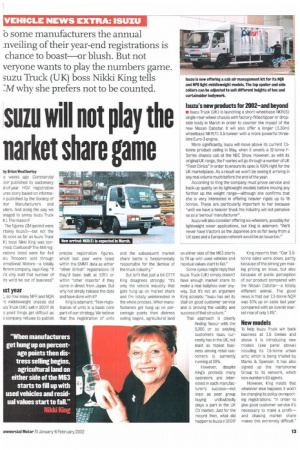sum will not play the market share game
Page 13

If you've noticed an error in this article please click here to report it so we can fix it.
b some manufacturers the annual nveiling of their year-end registrations is chance to boast—or blush. But not veryone wants to play the numbers game. suzu Truck (UK) boss Nikki King tells 11/1 why she prefers not to be counted.
by Brian Weatherley
o weeks ago Commercial )tor published its customary d-of-year HGV registration ures story based on informan published by the Society of kw Manufacturers and iders. And along the way we inaged to annoy Isuzu Truck K). The reason?
The figures CM quoted were rtainly Isuzu's—but not the ht ones as far as !sun Truck K) boss Nikki King was conmed. Confused? The 484 ragrations listed were for 4x4 al Troopers sold through ernational Motors—a totally trent company, says King: "If
only sold that number of its we'd be out of business!"
1st year
so how many NPR and NQR it middleweight chassis did izu Truck (UK) sell in 2001? At s point things get difficult as ?. company refuses to publish precise registration figures, which last year were listed within the SMMT data as either "other British" registrations (if they'd been built at ERF) or within "other imports' if they came in direct from Japan. But why not simply release the data and have done with it?
King is adamant: "Non-registration of units is a basic core part of our strategy. We believe that the registration of units and the subsequent market share battle is fundamentally responsible for the demise of the truck industry."
But isn't that just a bit OTT? King disagrees strongly: "It's only the vehicle industry that gets hung up on market share and I'm totally uninterested in the whole process. When manufacturers get hung up on percentage points then distress selling begins, agricultural land on either side of the M63 starts to fill up with used vehicles and residual values start to fall."
Some cynics might reply that Isuzu Truck (UK) simply doesn't have enough market share to make a real ballyhoo over anyway. But it's not an argument King accepts: "Isuzu has set its stall on good customer service and is proving the validity and success of that structure," That approach is clearly finding favour with the 5,000 or so existing customers Isuzu currently has in the UK, not least as repeat business among retail customers is currently running at 38%.
However, despite King's protests many operators are interested in each manufacturer's success—not least as peer group buying undoubtedly plays a part in the UK CV market. Just for the record then, what did happen to Isuzu in 2001? King reports that: "Our 3.8tonne sales were down, partly because of the strong yen making pricing an issue, but also because of public perception of our product compared with the Nissan Cabstar—a totally different animal. The good news is that our 7.5-tonne NOR was 30% up on sales last year compared with an overall market rise of only 1.4%".
New models
To help Isuzu Truck win back business at 3.5 tonnes and above it is introducing new models (see panel above) including its 7.5-tome urban artic which is being trialled by Marks & Spencer. it has also signed up the Hartshorne Group to its network, which now numbers 63 agents.
However, King insists that whatever else happens it won't be changing its policy on reporting registrations: in order to give good customer service it's necessary to make a profit— and chasing market share makes this extremely difficult."
















































































































































